Evaluation on IT Ethics: Analysis of NSA Surveillance and Edward Snowden's Disclosure
VerifiedAdded on 2023/04/26
|7
|1810
|134
Assignment
AI Summary
In this assignment we will discuss about ethical theory and below are the summaries point:-
The National Security Agency's secret surveillance using internet programs and collection of metadata raises ethical issues related to privacy.
The NSA's actions are highly unethical and violate the ACS Code of Professional Conduct's values of primacy of public interest, professionalism, and competence.
Edward Snowden's disclosure of the confidential practices has sparked debate and controversy, with some seeing him as a traitor and others as a hero, but the impacts of his actions may lead to positive change in the future. Utilitarianism is a moral theory focused on outcomes, and in this case, the consequences of the disclosure of the NSA's monitoring practices will determine whether it was morally right or wrong.
Contribute Materials
Your contribution can guide someone’s learning journey. Share your
documents today.
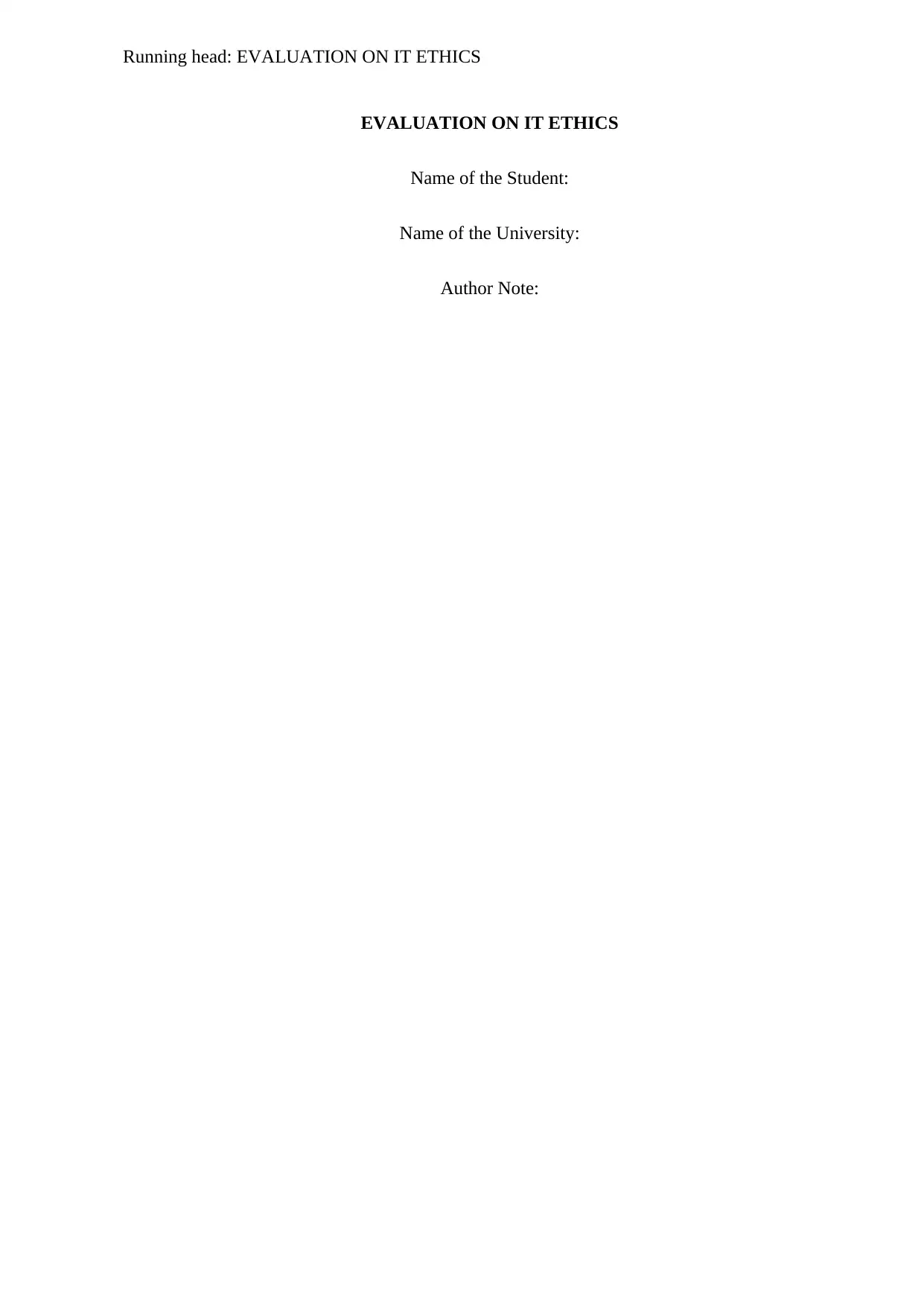
Running head: EVALUATION ON IT ETHICS
EVALUATION ON IT ETHICS
Name of the Student:
Name of the University:
Author Note:
EVALUATION ON IT ETHICS
Name of the Student:
Name of the University:
Author Note:
Secure Best Marks with AI Grader
Need help grading? Try our AI Grader for instant feedback on your assignments.
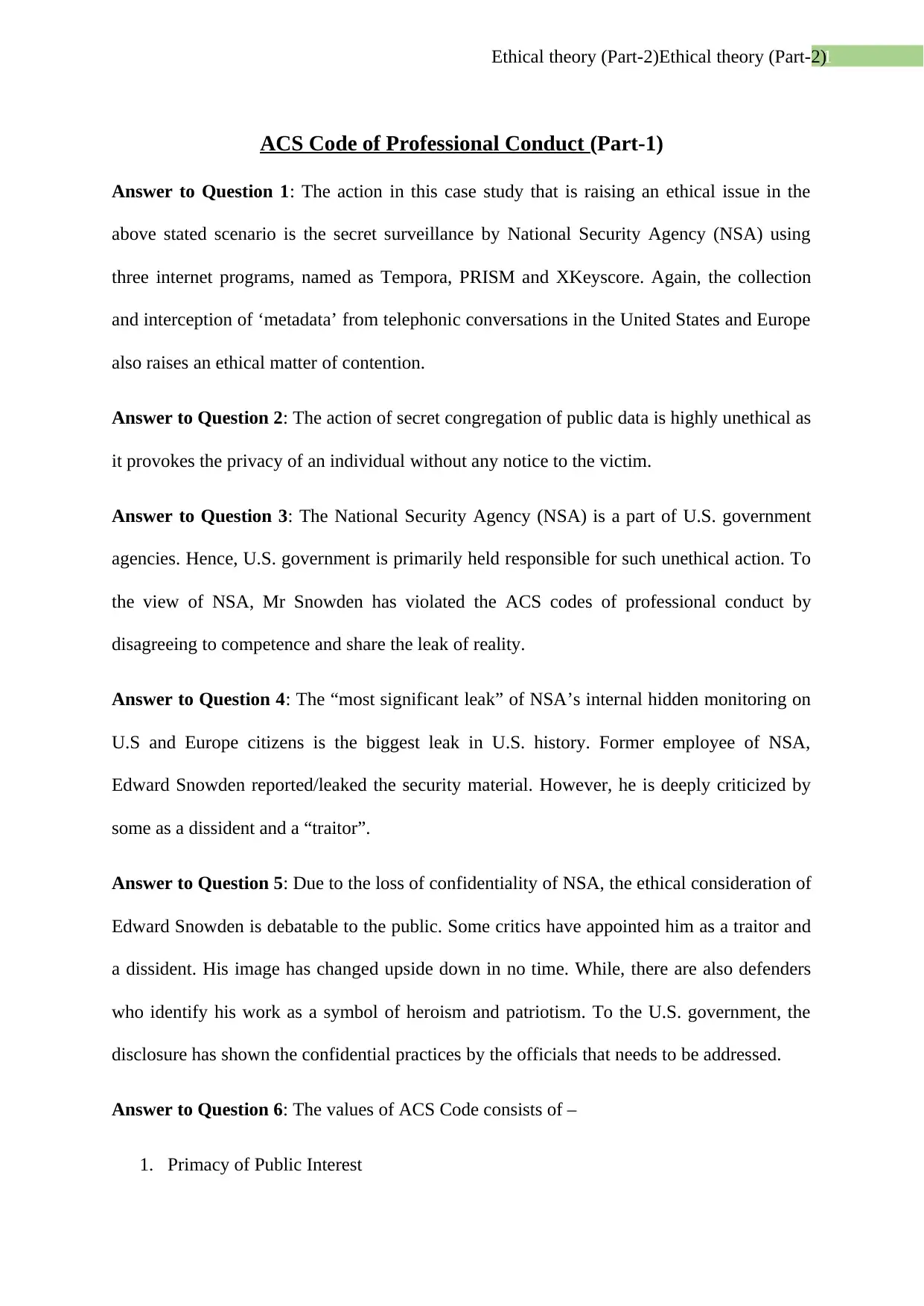
1Ethical theory (Part-2)Ethical theory (Part-2)
ACS Code of Professional Conduct (Part-1)
Answer to Question 1: The action in this case study that is raising an ethical issue in the
above stated scenario is the secret surveillance by National Security Agency (NSA) using
three internet programs, named as Tempora, PRISM and XKeyscore. Again, the collection
and interception of ‘metadata’ from telephonic conversations in the United States and Europe
also raises an ethical matter of contention.
Answer to Question 2: The action of secret congregation of public data is highly unethical as
it provokes the privacy of an individual without any notice to the victim.
Answer to Question 3: The National Security Agency (NSA) is a part of U.S. government
agencies. Hence, U.S. government is primarily held responsible for such unethical action. To
the view of NSA, Mr Snowden has violated the ACS codes of professional conduct by
disagreeing to competence and share the leak of reality.
Answer to Question 4: The “most significant leak” of NSA’s internal hidden monitoring on
U.S and Europe citizens is the biggest leak in U.S. history. Former employee of NSA,
Edward Snowden reported/leaked the security material. However, he is deeply criticized by
some as a dissident and a “traitor”.
Answer to Question 5: Due to the loss of confidentiality of NSA, the ethical consideration of
Edward Snowden is debatable to the public. Some critics have appointed him as a traitor and
a dissident. His image has changed upside down in no time. While, there are also defenders
who identify his work as a symbol of heroism and patriotism. To the U.S. government, the
disclosure has shown the confidential practices by the officials that needs to be addressed.
Answer to Question 6: The values of ACS Code consists of –
1. Primacy of Public Interest
ACS Code of Professional Conduct (Part-1)
Answer to Question 1: The action in this case study that is raising an ethical issue in the
above stated scenario is the secret surveillance by National Security Agency (NSA) using
three internet programs, named as Tempora, PRISM and XKeyscore. Again, the collection
and interception of ‘metadata’ from telephonic conversations in the United States and Europe
also raises an ethical matter of contention.
Answer to Question 2: The action of secret congregation of public data is highly unethical as
it provokes the privacy of an individual without any notice to the victim.
Answer to Question 3: The National Security Agency (NSA) is a part of U.S. government
agencies. Hence, U.S. government is primarily held responsible for such unethical action. To
the view of NSA, Mr Snowden has violated the ACS codes of professional conduct by
disagreeing to competence and share the leak of reality.
Answer to Question 4: The “most significant leak” of NSA’s internal hidden monitoring on
U.S and Europe citizens is the biggest leak in U.S. history. Former employee of NSA,
Edward Snowden reported/leaked the security material. However, he is deeply criticized by
some as a dissident and a “traitor”.
Answer to Question 5: Due to the loss of confidentiality of NSA, the ethical consideration of
Edward Snowden is debatable to the public. Some critics have appointed him as a traitor and
a dissident. His image has changed upside down in no time. While, there are also defenders
who identify his work as a symbol of heroism and patriotism. To the U.S. government, the
disclosure has shown the confidential practices by the officials that needs to be addressed.
Answer to Question 6: The values of ACS Code consists of –
1. Primacy of Public Interest
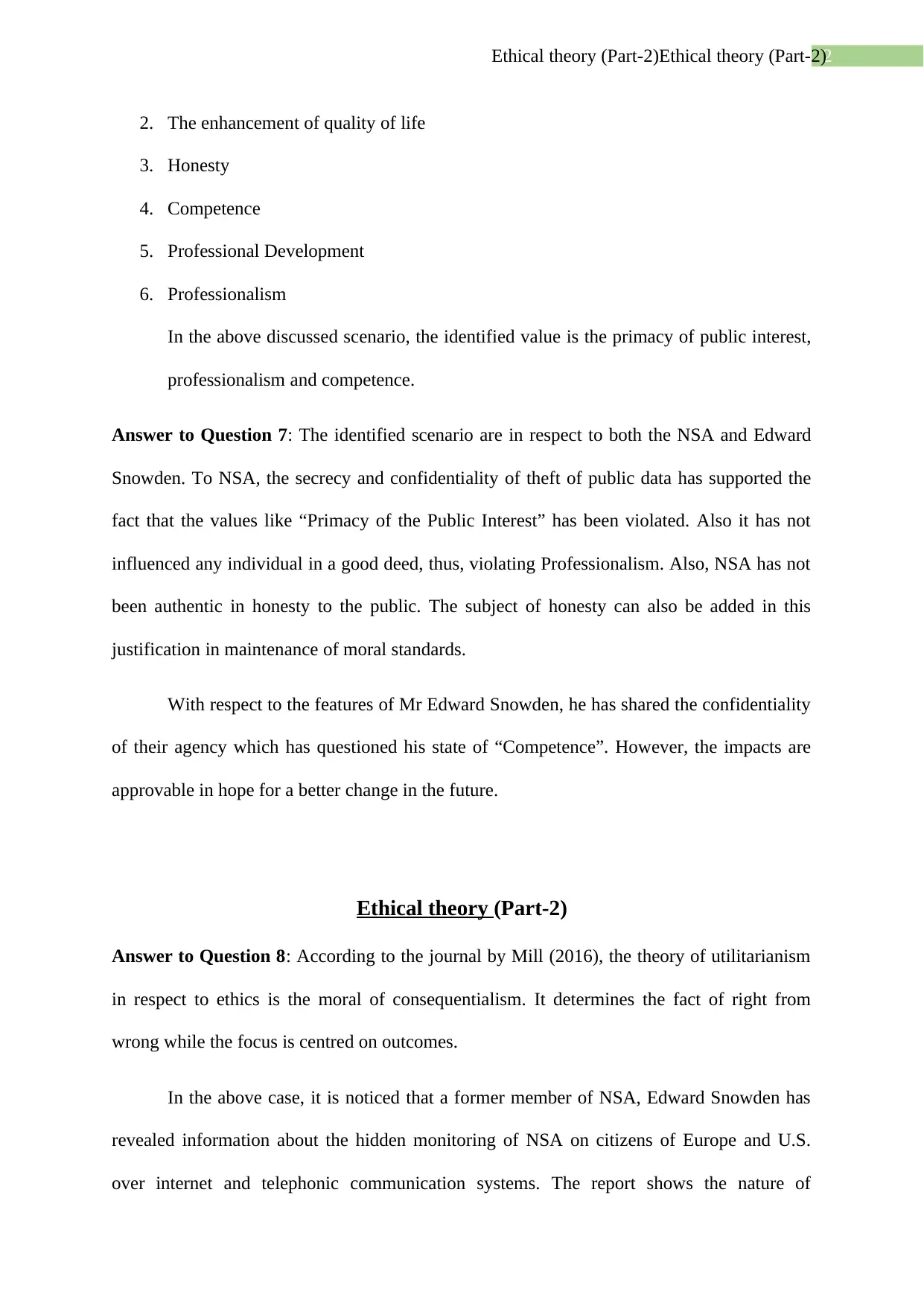
2Ethical theory (Part-2)Ethical theory (Part-2)
2. The enhancement of quality of life
3. Honesty
4. Competence
5. Professional Development
6. Professionalism
In the above discussed scenario, the identified value is the primacy of public interest,
professionalism and competence.
Answer to Question 7: The identified scenario are in respect to both the NSA and Edward
Snowden. To NSA, the secrecy and confidentiality of theft of public data has supported the
fact that the values like “Primacy of the Public Interest” has been violated. Also it has not
influenced any individual in a good deed, thus, violating Professionalism. Also, NSA has not
been authentic in honesty to the public. The subject of honesty can also be added in this
justification in maintenance of moral standards.
With respect to the features of Mr Edward Snowden, he has shared the confidentiality
of their agency which has questioned his state of “Competence”. However, the impacts are
approvable in hope for a better change in the future.
Ethical theory (Part-2)
Answer to Question 8: According to the journal by Mill (2016), the theory of utilitarianism
in respect to ethics is the moral of consequentialism. It determines the fact of right from
wrong while the focus is centred on outcomes.
In the above case, it is noticed that a former member of NSA, Edward Snowden has
revealed information about the hidden monitoring of NSA on citizens of Europe and U.S.
over internet and telephonic communication systems. The report shows the nature of
2. The enhancement of quality of life
3. Honesty
4. Competence
5. Professional Development
6. Professionalism
In the above discussed scenario, the identified value is the primacy of public interest,
professionalism and competence.
Answer to Question 7: The identified scenario are in respect to both the NSA and Edward
Snowden. To NSA, the secrecy and confidentiality of theft of public data has supported the
fact that the values like “Primacy of the Public Interest” has been violated. Also it has not
influenced any individual in a good deed, thus, violating Professionalism. Also, NSA has not
been authentic in honesty to the public. The subject of honesty can also be added in this
justification in maintenance of moral standards.
With respect to the features of Mr Edward Snowden, he has shared the confidentiality
of their agency which has questioned his state of “Competence”. However, the impacts are
approvable in hope for a better change in the future.
Ethical theory (Part-2)
Answer to Question 8: According to the journal by Mill (2016), the theory of utilitarianism
in respect to ethics is the moral of consequentialism. It determines the fact of right from
wrong while the focus is centred on outcomes.
In the above case, it is noticed that a former member of NSA, Edward Snowden has
revealed information about the hidden monitoring of NSA on citizens of Europe and U.S.
over internet and telephonic communication systems. The report shows the nature of
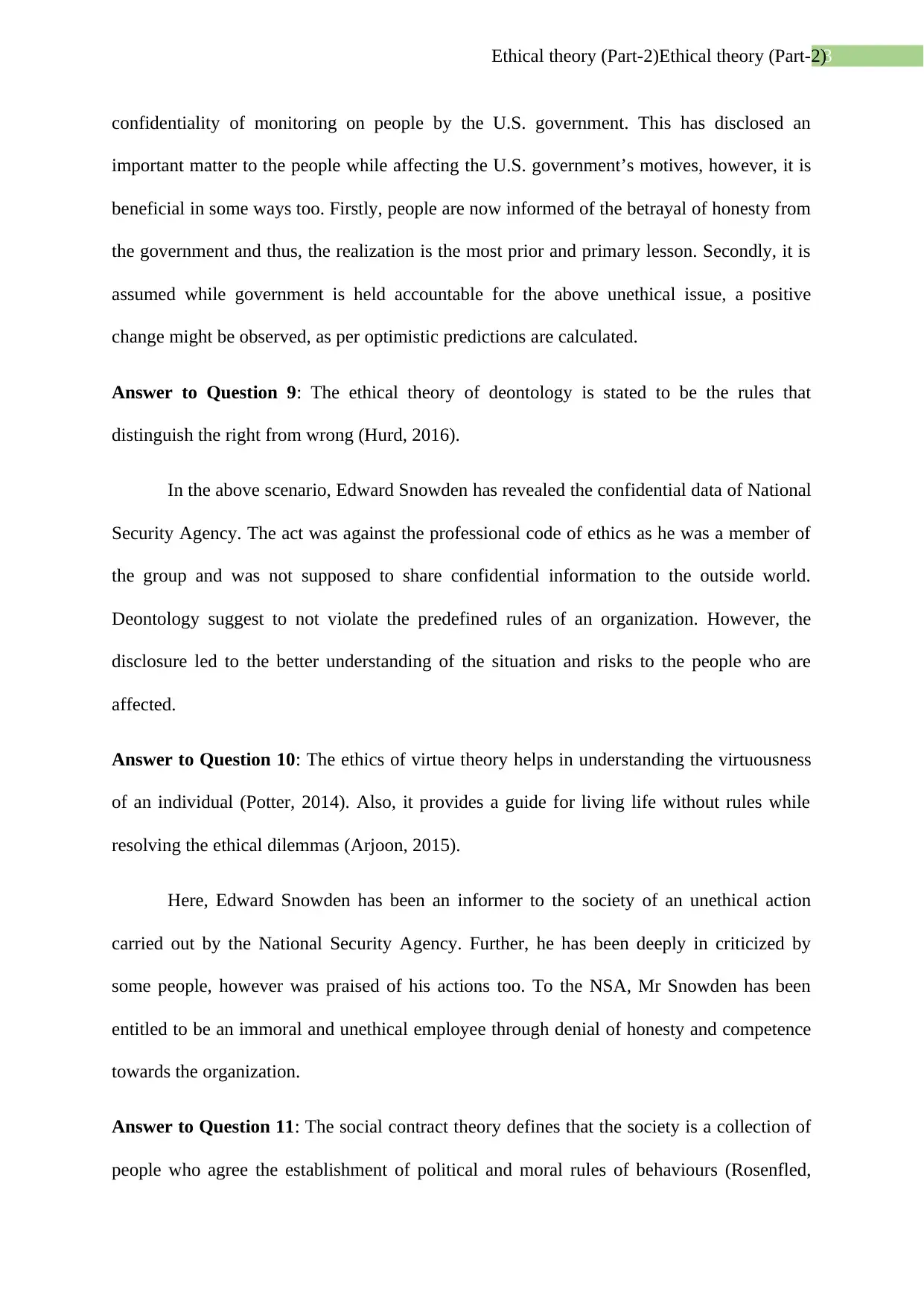
3Ethical theory (Part-2)Ethical theory (Part-2)
confidentiality of monitoring on people by the U.S. government. This has disclosed an
important matter to the people while affecting the U.S. government’s motives, however, it is
beneficial in some ways too. Firstly, people are now informed of the betrayal of honesty from
the government and thus, the realization is the most prior and primary lesson. Secondly, it is
assumed while government is held accountable for the above unethical issue, a positive
change might be observed, as per optimistic predictions are calculated.
Answer to Question 9: The ethical theory of deontology is stated to be the rules that
distinguish the right from wrong (Hurd, 2016).
In the above scenario, Edward Snowden has revealed the confidential data of National
Security Agency. The act was against the professional code of ethics as he was a member of
the group and was not supposed to share confidential information to the outside world.
Deontology suggest to not violate the predefined rules of an organization. However, the
disclosure led to the better understanding of the situation and risks to the people who are
affected.
Answer to Question 10: The ethics of virtue theory helps in understanding the virtuousness
of an individual (Potter, 2014). Also, it provides a guide for living life without rules while
resolving the ethical dilemmas (Arjoon, 2015).
Here, Edward Snowden has been an informer to the society of an unethical action
carried out by the National Security Agency. Further, he has been deeply in criticized by
some people, however was praised of his actions too. To the NSA, Mr Snowden has been
entitled to be an immoral and unethical employee through denial of honesty and competence
towards the organization.
Answer to Question 11: The social contract theory defines that the society is a collection of
people who agree the establishment of political and moral rules of behaviours (Rosenfled,
confidentiality of monitoring on people by the U.S. government. This has disclosed an
important matter to the people while affecting the U.S. government’s motives, however, it is
beneficial in some ways too. Firstly, people are now informed of the betrayal of honesty from
the government and thus, the realization is the most prior and primary lesson. Secondly, it is
assumed while government is held accountable for the above unethical issue, a positive
change might be observed, as per optimistic predictions are calculated.
Answer to Question 9: The ethical theory of deontology is stated to be the rules that
distinguish the right from wrong (Hurd, 2016).
In the above scenario, Edward Snowden has revealed the confidential data of National
Security Agency. The act was against the professional code of ethics as he was a member of
the group and was not supposed to share confidential information to the outside world.
Deontology suggest to not violate the predefined rules of an organization. However, the
disclosure led to the better understanding of the situation and risks to the people who are
affected.
Answer to Question 10: The ethics of virtue theory helps in understanding the virtuousness
of an individual (Potter, 2014). Also, it provides a guide for living life without rules while
resolving the ethical dilemmas (Arjoon, 2015).
Here, Edward Snowden has been an informer to the society of an unethical action
carried out by the National Security Agency. Further, he has been deeply in criticized by
some people, however was praised of his actions too. To the NSA, Mr Snowden has been
entitled to be an immoral and unethical employee through denial of honesty and competence
towards the organization.
Answer to Question 11: The social contract theory defines that the society is a collection of
people who agree the establishment of political and moral rules of behaviours (Rosenfled,
Secure Best Marks with AI Grader
Need help grading? Try our AI Grader for instant feedback on your assignments.
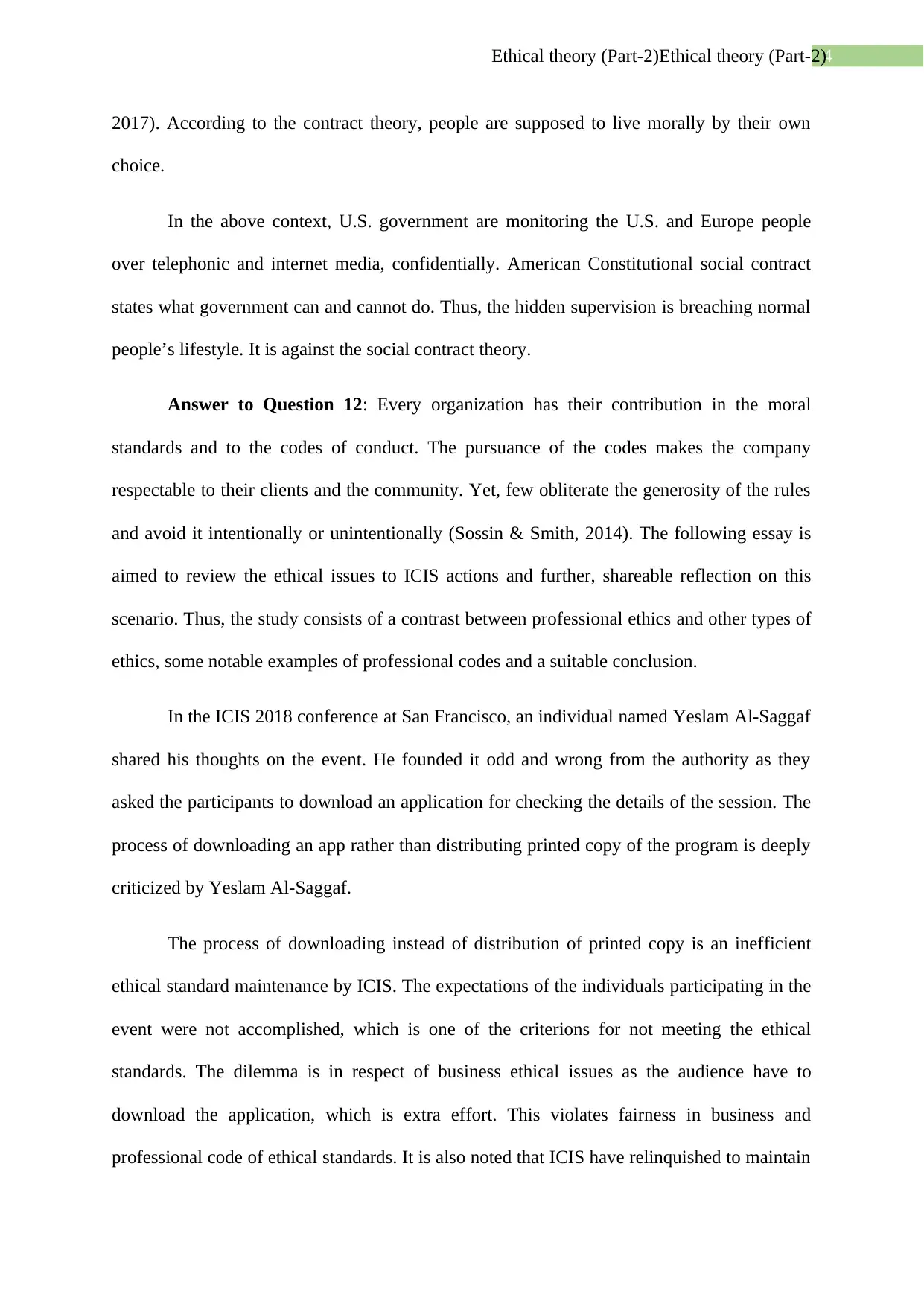
4Ethical theory (Part-2)Ethical theory (Part-2)
2017). According to the contract theory, people are supposed to live morally by their own
choice.
In the above context, U.S. government are monitoring the U.S. and Europe people
over telephonic and internet media, confidentially. American Constitutional social contract
states what government can and cannot do. Thus, the hidden supervision is breaching normal
people’s lifestyle. It is against the social contract theory.
Answer to Question 12: Every organization has their contribution in the moral
standards and to the codes of conduct. The pursuance of the codes makes the company
respectable to their clients and the community. Yet, few obliterate the generosity of the rules
and avoid it intentionally or unintentionally (Sossin & Smith, 2014). The following essay is
aimed to review the ethical issues to ICIS actions and further, shareable reflection on this
scenario. Thus, the study consists of a contrast between professional ethics and other types of
ethics, some notable examples of professional codes and a suitable conclusion.
In the ICIS 2018 conference at San Francisco, an individual named Yeslam Al-Saggaf
shared his thoughts on the event. He founded it odd and wrong from the authority as they
asked the participants to download an application for checking the details of the session. The
process of downloading an app rather than distributing printed copy of the program is deeply
criticized by Yeslam Al-Saggaf.
The process of downloading instead of distribution of printed copy is an inefficient
ethical standard maintenance by ICIS. The expectations of the individuals participating in the
event were not accomplished, which is one of the criterions for not meeting the ethical
standards. The dilemma is in respect of business ethical issues as the audience have to
download the application, which is extra effort. This violates fairness in business and
professional code of ethical standards. It is also noted that ICIS have relinquished to maintain
2017). According to the contract theory, people are supposed to live morally by their own
choice.
In the above context, U.S. government are monitoring the U.S. and Europe people
over telephonic and internet media, confidentially. American Constitutional social contract
states what government can and cannot do. Thus, the hidden supervision is breaching normal
people’s lifestyle. It is against the social contract theory.
Answer to Question 12: Every organization has their contribution in the moral
standards and to the codes of conduct. The pursuance of the codes makes the company
respectable to their clients and the community. Yet, few obliterate the generosity of the rules
and avoid it intentionally or unintentionally (Sossin & Smith, 2014). The following essay is
aimed to review the ethical issues to ICIS actions and further, shareable reflection on this
scenario. Thus, the study consists of a contrast between professional ethics and other types of
ethics, some notable examples of professional codes and a suitable conclusion.
In the ICIS 2018 conference at San Francisco, an individual named Yeslam Al-Saggaf
shared his thoughts on the event. He founded it odd and wrong from the authority as they
asked the participants to download an application for checking the details of the session. The
process of downloading an app rather than distributing printed copy of the program is deeply
criticized by Yeslam Al-Saggaf.
The process of downloading instead of distribution of printed copy is an inefficient
ethical standard maintenance by ICIS. The expectations of the individuals participating in the
event were not accomplished, which is one of the criterions for not meeting the ethical
standards. The dilemma is in respect of business ethical issues as the audience have to
download the application, which is extra effort. This violates fairness in business and
professional code of ethical standards. It is also noted that ICIS have relinquished to maintain
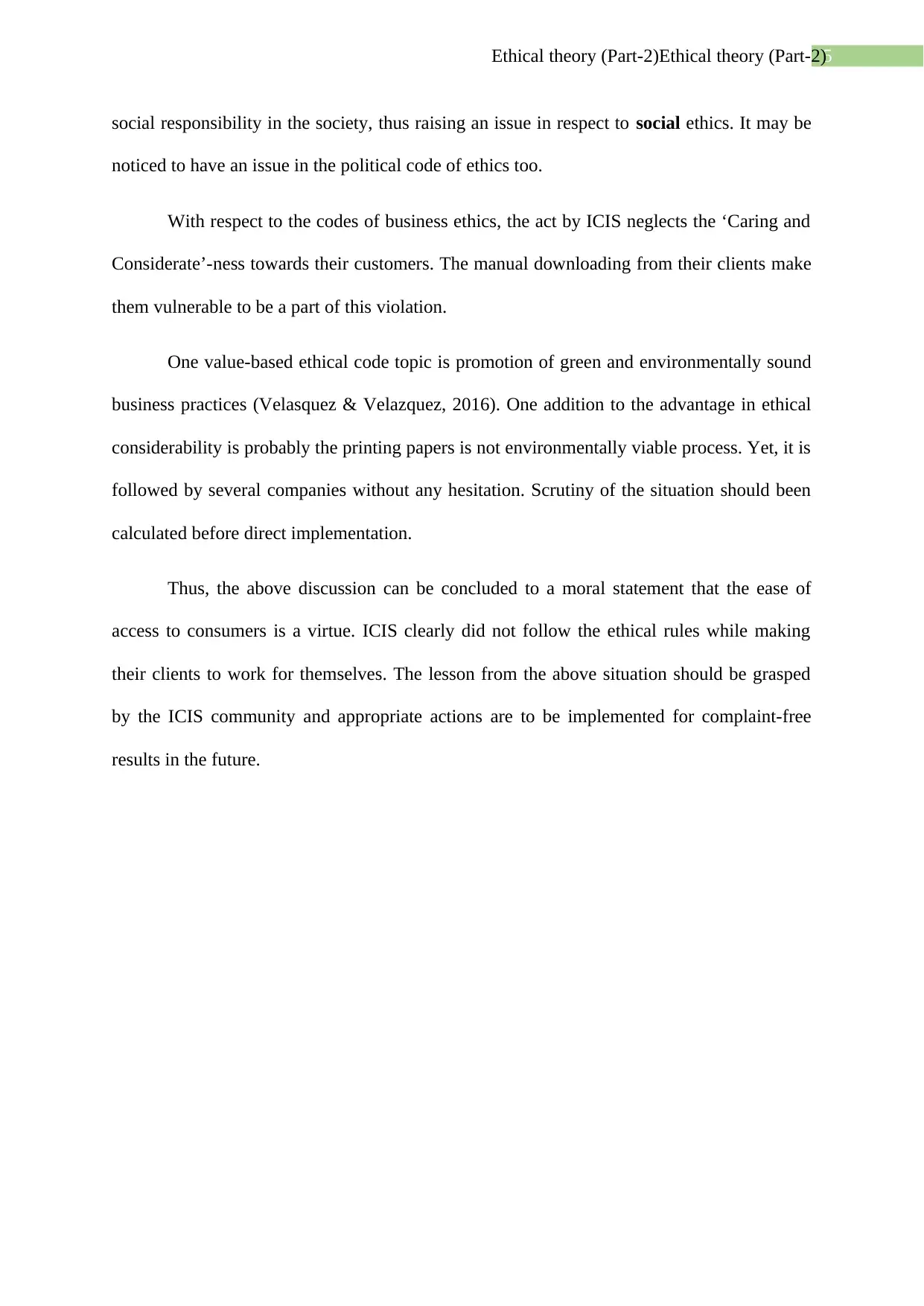
5Ethical theory (Part-2)Ethical theory (Part-2)
social responsibility in the society, thus raising an issue in respect to social ethics. It may be
noticed to have an issue in the political code of ethics too.
With respect to the codes of business ethics, the act by ICIS neglects the ‘Caring and
Considerate’-ness towards their customers. The manual downloading from their clients make
them vulnerable to be a part of this violation.
One value-based ethical code topic is promotion of green and environmentally sound
business practices (Velasquez & Velazquez, 2016). One addition to the advantage in ethical
considerability is probably the printing papers is not environmentally viable process. Yet, it is
followed by several companies without any hesitation. Scrutiny of the situation should been
calculated before direct implementation.
Thus, the above discussion can be concluded to a moral statement that the ease of
access to consumers is a virtue. ICIS clearly did not follow the ethical rules while making
their clients to work for themselves. The lesson from the above situation should be grasped
by the ICIS community and appropriate actions are to be implemented for complaint-free
results in the future.
social responsibility in the society, thus raising an issue in respect to social ethics. It may be
noticed to have an issue in the political code of ethics too.
With respect to the codes of business ethics, the act by ICIS neglects the ‘Caring and
Considerate’-ness towards their customers. The manual downloading from their clients make
them vulnerable to be a part of this violation.
One value-based ethical code topic is promotion of green and environmentally sound
business practices (Velasquez & Velazquez, 2016). One addition to the advantage in ethical
considerability is probably the printing papers is not environmentally viable process. Yet, it is
followed by several companies without any hesitation. Scrutiny of the situation should been
calculated before direct implementation.
Thus, the above discussion can be concluded to a moral statement that the ease of
access to consumers is a virtue. ICIS clearly did not follow the ethical rules while making
their clients to work for themselves. The lesson from the above situation should be grasped
by the ICIS community and appropriate actions are to be implemented for complaint-free
results in the future.
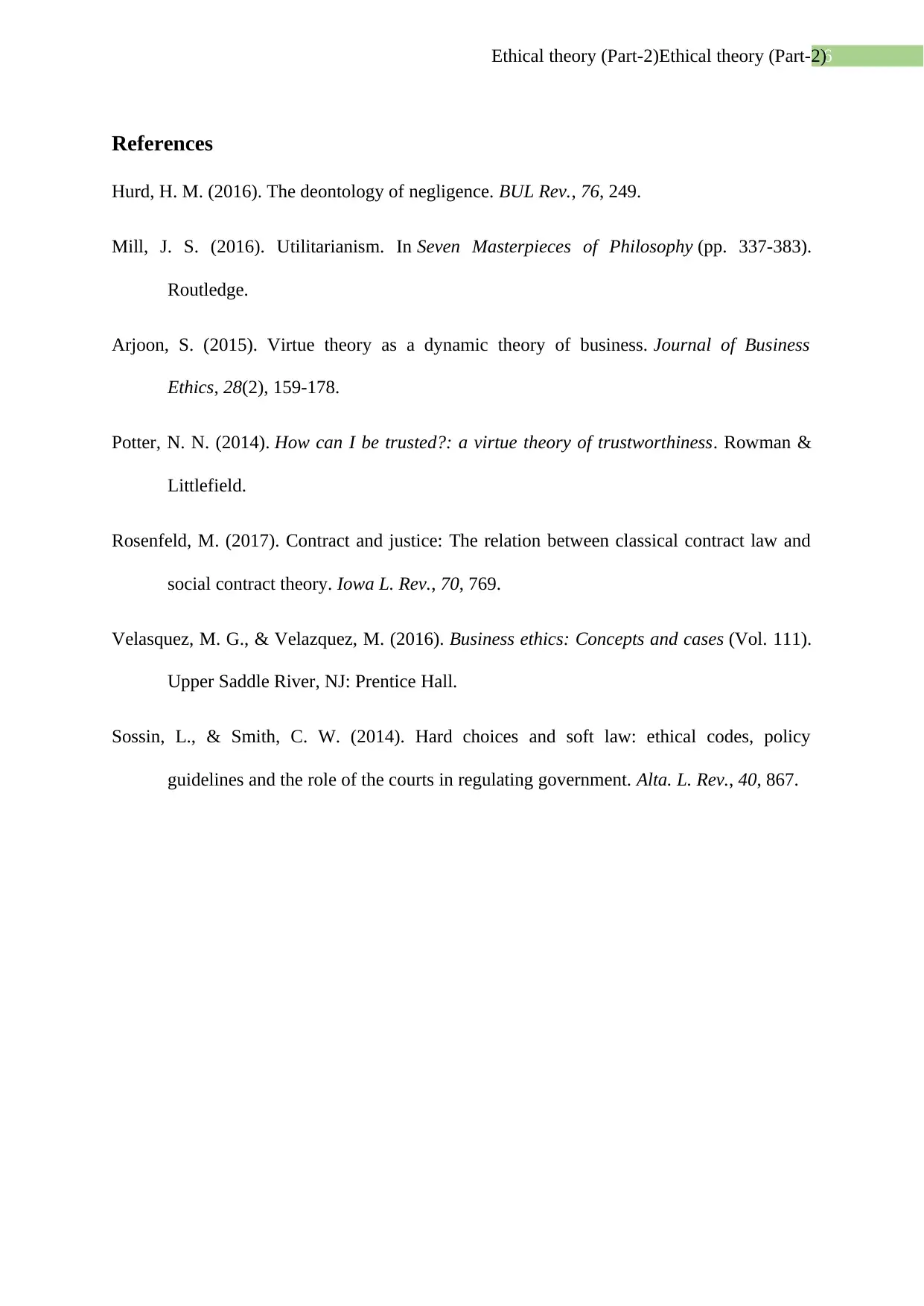
6Ethical theory (Part-2)Ethical theory (Part-2)
References
Hurd, H. M. (2016). The deontology of negligence. BUL Rev., 76, 249.
Mill, J. S. (2016). Utilitarianism. In Seven Masterpieces of Philosophy (pp. 337-383).
Routledge.
Arjoon, S. (2015). Virtue theory as a dynamic theory of business. Journal of Business
Ethics, 28(2), 159-178.
Potter, N. N. (2014). How can I be trusted?: a virtue theory of trustworthiness. Rowman &
Littlefield.
Rosenfeld, M. (2017). Contract and justice: The relation between classical contract law and
social contract theory. Iowa L. Rev., 70, 769.
Velasquez, M. G., & Velazquez, M. (2016). Business ethics: Concepts and cases (Vol. 111).
Upper Saddle River, NJ: Prentice Hall.
Sossin, L., & Smith, C. W. (2014). Hard choices and soft law: ethical codes, policy
guidelines and the role of the courts in regulating government. Alta. L. Rev., 40, 867.
References
Hurd, H. M. (2016). The deontology of negligence. BUL Rev., 76, 249.
Mill, J. S. (2016). Utilitarianism. In Seven Masterpieces of Philosophy (pp. 337-383).
Routledge.
Arjoon, S. (2015). Virtue theory as a dynamic theory of business. Journal of Business
Ethics, 28(2), 159-178.
Potter, N. N. (2014). How can I be trusted?: a virtue theory of trustworthiness. Rowman &
Littlefield.
Rosenfeld, M. (2017). Contract and justice: The relation between classical contract law and
social contract theory. Iowa L. Rev., 70, 769.
Velasquez, M. G., & Velazquez, M. (2016). Business ethics: Concepts and cases (Vol. 111).
Upper Saddle River, NJ: Prentice Hall.
Sossin, L., & Smith, C. W. (2014). Hard choices and soft law: ethical codes, policy
guidelines and the role of the courts in regulating government. Alta. L. Rev., 40, 867.
1 out of 7
Related Documents
Your All-in-One AI-Powered Toolkit for Academic Success.
+13062052269
info@desklib.com
Available 24*7 on WhatsApp / Email
![[object Object]](/_next/static/media/star-bottom.7253800d.svg)
Unlock your academic potential
© 2024 | Zucol Services PVT LTD | All rights reserved.





